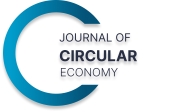The Circular Economy in the Construction Industry: From Research to Practice
Abstract
The transition to the circular economy (CE) in the construction industry requires a shift from conventional researcher’s roles and thinking styles. The shift is crucial for an industry, which is known for its massive waste generation and resource use globally. The need for collaboration skills cannot be over-emphasized since many CE initiatives involve several stakeholders with diverse interests and approaches to problem solving. It is crucial that CE researchers contribute to the development of theories that are relevant to social issues as well as science in order to enable real-world societal changes and to fast-track the transition to a circular construction sector.
DOI: https://doi.org/10.55845/DHNN3429
References
Adams, K. T., Osmani, M., Thorpe, T., & Thornback, J. (2017, February). Circular economy in construction: current awareness, challenges and enablers. Proceedings of the institution of civil engineers-waste and resource management 170, (1), 15-24. Thomas Telford Ltd.
Akanbi, L. A., Oyedele, L. O., Akinade, O. O., Ajayi, A. O., Delgado, M. D., Bilal, M., & Bello, S. A. (2018). Salvaging building materials in a circular economy: A BIM-based whole-life performance estimator. Resources, Conservation and Recycling, 129, 175-186.
Andersson, J., François-Ferrière, M., & Hoskova, K. (2023, December 23). Circular Solutions, community revolutions: The Social Impact of circularity. World Economic Forum. https://www.weforum.org/agenda/2023/12/circular-solutions-community-revolutions-the-social-impact-of-circularity/
Bakker, C. A., Den Hollander, M. C., Van Hinte, E., & Zijlstra, Y. (2014). Products that last: Product design for circular business models. TU Delft Library.
Brown, P., Von Daniels, C., Bocken, N. M., & Balkenende, A. R. (2021). A process model for collaboration in circular oriented innovation. Journal of Cleaner Production, 286, 125499. https://doi.org/10.1016/j.jclepro.2020.125499
Debacker, W., Manshoven, S., Peters, M., Ribeiro, A., & De Weerdt, Y. (2017, June). Circular economy and design for change within the built environment: preparing the transition. In International HISER conference on advances in recycling and management of construction and demolition waste (pp. 114-117). Delft University of Technology Delft, The Netherlands.
Ekins, P., Domenech, T., Drummond, P., Bleischwitz, R., Hughes, N. and Lotti, L. (2019), “The Circular Economy: What, Why, How and Where”, Background paper for an OECD/EC Workshop on 5 July 2019 within the workshop series “Managing environmental and energy transitions for regions and cities”, Paris.
Ellen MacArthur Foundation. (2019). Circular economy in the built environment. Retrieved from https://www.ellenmacarthurfoundation.org/assets/downloads/Built-Environment.pdf
Enel Américas. (2022, June 23). New professional skills that will drive the circular economy. https://www.enelamericas.com/en/circular-economy-latam/articles/new-professional-skills-that-will-drive-the-circular-economy.html
Fogarassy, C., & Finger, D. (2020). Theoretical and practical approaches of circular economy for business models and technological solutions. Resources, 9(6), 76. https://doi.org/10.3390/resources9060076
Greene, M., Hobson, K., & Jaeger-Erben, M. (2024). Bringing the circular economy home–Insights from socio-technical perspectives on everyday consumption. Cleaner and Responsible Consumption, 12, 100157. https://doi.org/10.1016/j.clrc.2023.100157
Leising, E., Quist, J., & Bocken, N. (2018). Circular Economy in the building sector: Three cases and a collaboration tool. Journal of Cleaner production, 176, 976-989.
Meseguer-Sánchez, V., Gálvez-Sánchez, F. J., Molina-Moreno, V., & Wandosell-Fernández-de-Bobadilla, G. (2021). The main research characteristics of the development of the concept of the circular economy concept: a global analysis and the future agenda. Frontiers in Environmental Science, 9, 704387. https://doi.org/10.3389/fenvs.2021.704387
Padilla-Rivera, A., Russo-Garrido, S., & Merveille, N. (2020). Addressing the social aspects of a circular economy: A systematic literature review. Sustainability, 12(19), 7912. https://doi.org/10.3390/su12197912
Pomponi, F., & Moncaster, A. (2017). Circular economy for the built environment: A research framework. Journal of cleaner production, 143, 710-718.
Rahla, K. M., Mateus, R., & Bragança, L. (2021). Selection criteria for building materials and components in line with the circular economy principles in the built environment—A review of current trends. Infrastructures, 6(4), 49.
RREUSE. (2023, March 27). Putting people and skills at the core of the circular economy: 18 stories from Social Enterprises. https://rreuse.org/putting-people-and-skills-at-the-core-of-the-circular-economy/
Salvioni, D. M., & Almici, A. (2020). Transitioning toward a circular economy: The impact of stakeholder engagement on sustainability culture. Sustainability, 12(20), 8641. https://doi.org/10.3390/su12208641
Sumter, D., de Koning, J., Bakker, C., & Balkenende, R. (2021). Key competencies for design in a circular economy: Exploring gaps in design knowledge and skills for a circular economy. Sustainability, 13(2), 776. https://doi.org/10.3390/su13020776
Zavos, S., Lehtokunnas, T., & Pyyhtinen, O. (2024). The (missing) social aspect of the circular economy: a review of social scientific articles. Sustainable Earth Reviews, 7(1), 11. https://doi.org/10.1186/s42055-024-00083-w
How to Cite This Article
Olabode E. Ogunmakinde.(2024). The Circular Economy In Construction Industry: From Research to Practice. Journal of Circular Economy,2(3). https://doi.org/10.55845/DHNN3429
Copyright
Open Access: This article is licensed under a Creative Commons Attribution 4.0 International License, which permits use, sharing, adaptation, distribution and reproduction in any medium or format, as long as you give appropriate credit to the original author(s) and the source, provide a link to the Creative Commons licence, and indicate if changes were made. The images or other third-party material in this article are included in the article’s Creative Commons licence, unless indicated otherwise in a credit line to the material. If material is not included in the article’s Creative Commons licence and your intended use is not permitted by statutory regulation or exceeds the permitted use, you will need to obtain permission directly from the copyright holder. To view a copy of this licence, visit http://creativecommons.org/licenses/by/4.0/.
Author Notes
Olabode E. Ogunmakinde[1]*
-
- [1] Central Queensland University, School of Engineering and Technology, Brisbane, QLD 4000, Australia
- * Corresponding author: [email protected]
Published Details: Received: 03.06.2024/ Accepted: 15.07.2024/ Published: 01.08.2024
